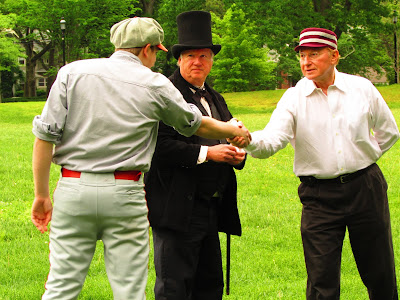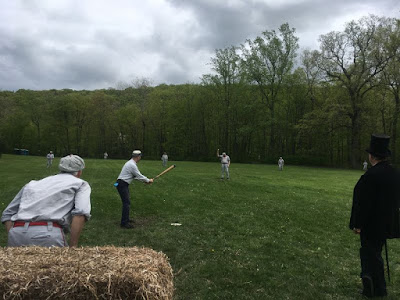The Neshanock's annual Memorial Day visit to Newtown, Pennsylvania to take on the hometown Strakes was cancelled for obvious reasons. After taking next weekend off, Flemington will visit the Howell Living History Farm on Saturday, June 10th. What follows is a reflection on why it's so important to remember our country's war dead originally written to accompany the game account.
Newark Star Eagle May 1919
Recently I've been thinking about something I wrote well over a decade ago, in my first book, The Mutinous Regiment: The Thirty-third New Jersey in the Civil War. The 33rd's heaviest combat losses came during the Atlanta Campaign which lasted from May to September of 1864. On July 20, 1864 at Peachtree Creek, the regiment had the extreme misfortune to be caught in an exposed position in front of the Union lines when the Confederates under John Bell Hood launched a surprise attack. Although the rebels were finally driven off, it was not before the 33rd suffered their highest combat losses of the war. Ironically, and it was a bitter irony, Peachtree Creek was not only the 33rd's bloodiest battle of the war, it was also their last. While it would take another year before the regiment returned home to New Jersey, they would never again be at risk of dying in battle. Considering that sharp divide between living and dying, it's not surprising I was moved to write "If life is unfair, little in life is less fair than war. In every war some go through combat unscathed to live long and full lives, while others, for no reason besides luck or chance, die without ever having had a chance to live." More than ten years, three other books and countless articles and blog posts later, I still think it's one of the best things I've written.
Parker Middleton of Newark, 369th Infantry Regiment - Killed in Action, September 30, 1918
What brought it to mind was not so much Memorial Day, but another war related project I'm working on this time about World War I. I've been asked to give a lecture for the Newark History Society on September 25th about the combat experience of Newark men in what was then called the Great War. It's not a subject I knew much about and researching it has shown the random unfairness of combat casualties was even greater for the dough boys of 1917-18 than for the Civil War generation. Not only was the duration of our country's participation in the war shorter, most American troops saw combat for no more than three to four months. The great majority of the men from New Jersey who served in World War I were part of either the 29th Division (the Rainbow Division) or the 78th Division (Jersey Lightening). Most of both divisions' combat experience came in the Meuse Argonne, a terrible struggle that lasted from September 26th to Armistice Day on November 11th. It was the longest battle in American History, lasting 47 days, but since units rotated in and out of line, the actual time in combat was shorter.
William Sawelson, 312th Regiment - Killed in Action, October 26, 1918
None of this is to suggest it was easy duty, Edward Lengel's excellent book on the battle is aptly entitled To Conquer Hell and describes the terrible losses suffered by inexperienced, poorly trained American soldiers going against some of the strongest German defenses on the western front. The 78th Division's story is a case in point, they were actively engaged for only nine days, but in that time, saw the unit's strength decline by 50% as they fought and died to take the citadel at Grandpre, a crucial position on the German's last important defensive line. But while it must have been terrible, the men of the 78th Division were at the most risk of dying in combat for little over a week. Even more so than the 33rd New Jersey's dead, the "unlucky" in the 78th Division had indeed died "without ever having a chance to live." Understanding the unfairness of battle and how much those men missed when they lost their lives in the service of our country can helps us, I think, to better understand their sacrifices and the importance of never forgetting them. As the British poet, Laurence Binyon wrote earlier in the war.
They shall grow not old, as we that are left grow old:
Age shall not weary them, nor the years condemn.
At the going down of the sun and in the morning,
We will remember them.
May it always be so.


















